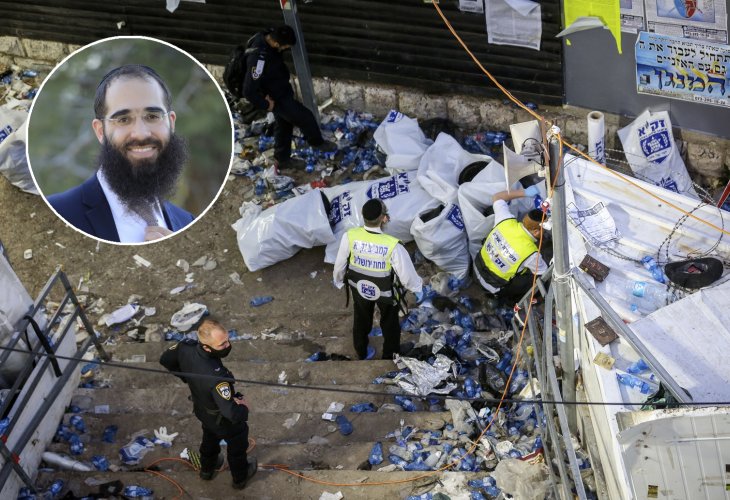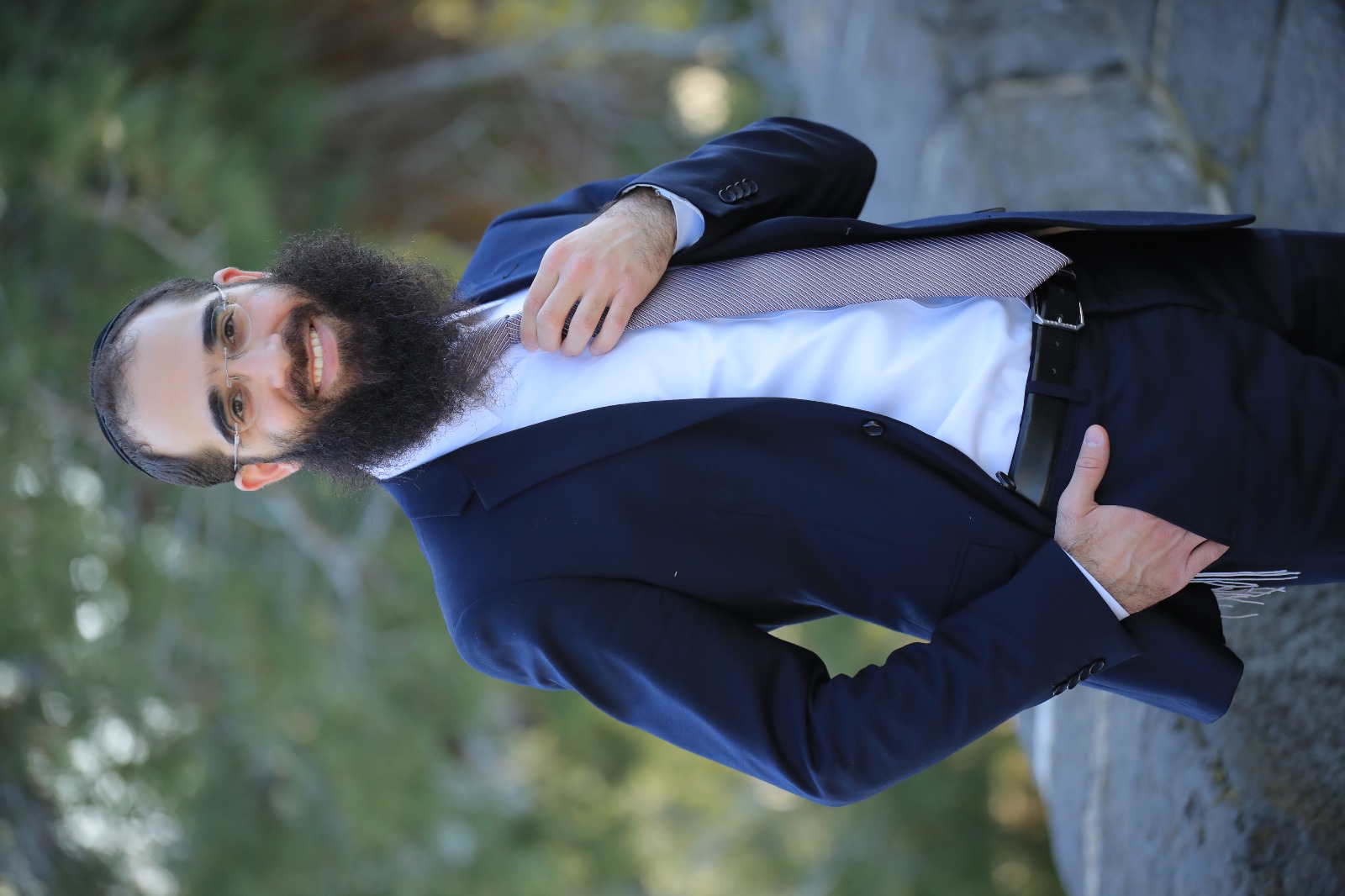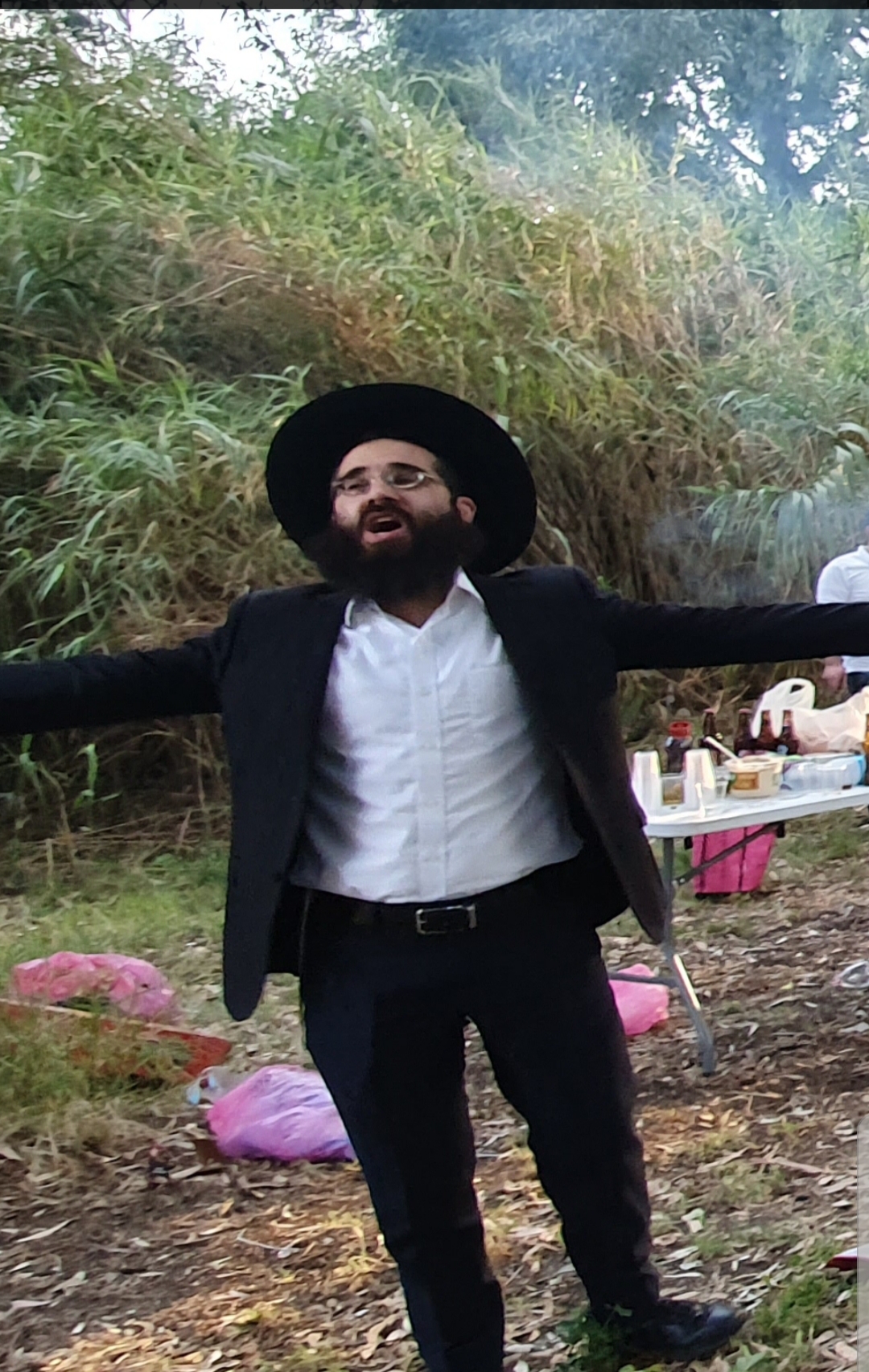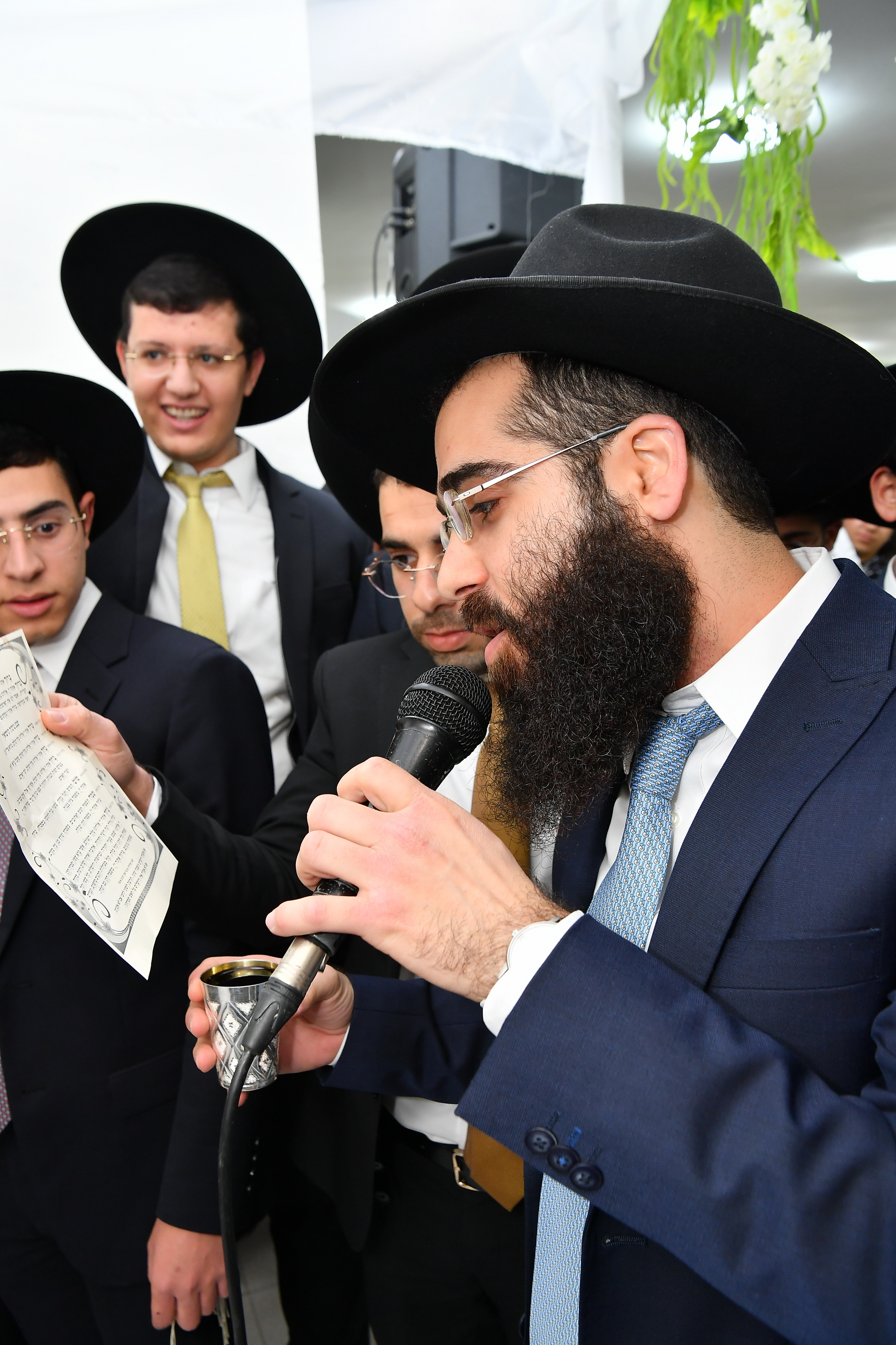Elkana Shila's Mother, One of the Meron Tragedy Victims: "I Arrived at the Gravesite and Saw Darkness in My Eyes"
Yael Shila recounts her son who was born and passed away on Lag BaOmer, deeply connected to Rabbi Shimon Bar Yochai. What responsibility did he take from a young age, what happened when his kippah fell off as a baby, and the special meaning his name carried at his passing?
 In the circle: Elkana Shila (Photo: David Cohen)
In the circle: Elkana Shila (Photo: David Cohen)After years of painful waiting and a special blessing from Rabbi Yitzchak Kaduri of blessed memory, Yael Shila was blessed with her first daughter. Afterwards, a son was born, still a miracle to his parents, named Elkana in Israel. "We named him that because we wanted to say that this child is a possession of Hashem, and for me, it meant that he would be God-fearing and adhere to the commandments," says Yael. "I never thought that one day this name would take on such a different meaning. Elkana never got married, and last Lag BaOmer, I understood he was entirely a possession of Hashem, and so he returned to Him." The son who was born on Lag BaOmer passed away 28 years later, on the same day, and was also buried on that day, about an hour before Shabbat began.
 Elkana Shila
Elkana Shila
A Father, Even Without Children
From a young age, Elkana’s mother saw something special in him. "He wasn’t an ordinary child from the start, and for his birth, I went with a knitted cap to place it on his head as a kippah immediately when he was born," she says. "From that day, the kippah never came off his head. One night, when he was a year and a half old, it fell off, and he woke up and cried loudly, not typical for his age, until we placed it back on his head. When he was two, I took him to a store selling religious items. He looked around and asked me, 'Mom, why do all the rabbis in the pictures have big kippahs, but mine doesn’t cover my entire head?' I told him he could choose any kippah he wanted, and I’d buy it for him. Elkana chose a size 8 kippah, one that was enormous on him and covered his entire head, and he was delighted to wear it."
Years passed, and when Elkana reached eighth grade, his teacher made an unusual request. "He took him aside and explained that all his friends must be accepted into yeshivas for the following year. Then he said, 'I’m a teacher and you’re a teacher, let’s help all those who are struggling.' The teacher knew who to ask because Elkana, who knew how to uplift those around him, took on the task and tried to help his friends as much as he could. Even when time passed and the task became a bit burdensome, I encouraged him to keep helping, knowing that this assistance was very significant for them. Looking back, Elkana passed away without the chance to bring children into the world, but to me, his children are the friends who got into good yeshivas thanks to him and went on to build homes of Torah."
Even an excellent student like Elkana did not always find his place. "When he reached the large yeshiva, the place didn’t suit his nature, and when my husband went to visit him, he found him sitting alone, sad in a room. Nonetheless, from this misfit situation, he reached a place where he flourished. They established the 'Tiferet HaLevi HaGadol' yeshiva, and he became part of its founding group. Following the turmoil and difficulty he faced previously, Elkana decided that, in the new place, he would be the one to look after the new boys who came to the yeshiva."

How Did This Manifest?
"As we were leaving the cemetery after his funeral, a boy approached me and said, 'My Torah is Elkana's.' That boy told me that when he arrived at the yeshiva, he looked right and left and saw that nobody paid attention to him. A day and two passed, and he was still alone. He thought of packing his suitcase and leaving when Elkana approached him and asked for his name. From there, they went together to his room, and Elkana helped him arrange the closet. He inquired what exactly that boy was learning and even sat to learn with him. In the end, Elkana told the boy, 'If you need anything else, I’m here.' After all this, it was clear that the boy stayed in the yeshiva. Elkana also instigated that the first-year students would get food first. He always said, 'They are the soft kids, and we have patience, we’ll wait.' During his shiva, I encountered this again; he did not manage to become a father to his own children, but he was a father and a leader to so many boys. He took personal interest in every new boy that came to the yeshiva and gave them the feeling that someone noticed them. He also personally cared for my younger sons, helped them get into yeshivas, and always inquired about their status."
"Why Does It Matter to You? Another Mitzvah"
Presumably, you waited many years to see him stand under the chuppah?
"Yes, he had many offers, but none were suitable. It wasn’t easy for me, but looking back today, I understand he probably didn’t belong to anyone. He was a possession of Hashem and reached his specific mission in the world."
Nevertheless, at others’ weddings, Elkana danced with all his might. "During the shiva, people I didn’t know came to see me, but they knew Elkana, and they told me how important it was for him to bring joy to grooms and brides. He didn’t always know them but was present at every wedding where there weren’t enough dancers, making it endlessly joyful. People brought me pictures from their weddings, showing him dancing enthusiastically. He went to bring joy to weddings even during the COVID period and used to say to me each time, 'Mom, why do you care? Another mitzvah.'"
Yael heard these same words in other circumstances. "Last Passover eve, when Elkana came to kasher the counter, he got burned from the boiling water. It hurt him a lot, and he even shed tears, but he returned later to finish his task. When he saw me surprised by his effort, he again said to me, 'Why do you care, Mom? Another mitzvah.' It didn’t matter to him if it hurt or not, the main thing was to complete his responsibility to the end."
Another fact Yael discovered after her son's death was about his stringent observance of food kashrut. "He decided not to eat anything at the yeshiva that could have any issue with insects. For instance, throughout his six years of study at the yeshiva, he never ate rice there. When I heard about this, it was a bit hard for me to accept that my son sometimes subsisted only on carbohydrates and packaged goods, but it was his decision. Also, in the period before his death, he moved to a yeshiva closer to home, one that had only a small number of students. One Friday evening, the head of the yeshiva saw him arriving with a pot of cholent and asked why he was bringing food from home. Elkana explained that he couldn’t eat in a place where he didn’t know who sorted the food. At that moment, the head of the yeshiva told him that from that day onward, he would be in charge of the kitchen. Elkana came home full of enthusiasm and told me he needed a drill to make a small hole in the dairy cutlery for marking it. He also bought stickers in different colors to label all the kitchen utensils and added paint to mark the pots from the outside. He was the one responsible for sorting the rice and other food products, and only then was he at peace to eat calmly in the yeshiva. When we visited there after his death, I was moved to see everything marked impeccably in red, blue, and green, even the plastic bowls. He didn’t want to leave any small gap for error for any of the yeshiva boys."
Throughout his life, Elkana remained dedicated to the study of Torah, and in the last year, he was also in charge of waking the boys up in the morning. "The mashgiach asked him to take on this role because everyone loved him, and indeed, he did it with great charm, and when he woke them up, he called each boy by a nickname. It was important to him to do this gently, not to upset anyone, and to give each student the responsibility to wake up himself, without forcing him. It did not matter where Elkana was at night - at home, in the yeshiva, in Tzfat, or in Meron, he was always ready in the morning to fulfill his role."

Closing a Circle
Elkana was born on Lag BaOmer, did he have any special connection to this day?
"From the day Elkana was born, he loved Rabbi Shimon Bar Yochai with all his soul. From a very young age, he traveled to Meron at every possible opportunity. As he grew older, he traveled endlessly to study at Rabbi Shimon's grave on Thursday night, then returned home or to the yeshiva for Shabbat."
On the yahrzeit itself, Elkana repeated a habit Yael never understood. "He never worried about getting a ticket to the site, yet he was always sure he would get there. We sometimes laughed about it, but for him, it was something beyond nature, and he truly lived it. This year, he called me to say, again, that he didn’t have a ticket, and I replied that from Heaven it worked out that we had two extra tickets. So he boarded the bus with a friend, and as soon as he arrived at the site, he updated us. By then, I and my daughters, and two of his brothers were already there. He danced there every year until he was completely soaked."
Yet this time, Yael felt that something wrong was going to happen. "As soon as I got off the bus, I saw darkness in my eyes and felt that it was not right for me to be there. I was broken inside and just wanted to go home. The girls didn’t understand what was happening to me and said, 'Mom, look how joyful it is here.' I stayed a while longer until I couldn’t anymore, then decided to go home. As soon as I boarded the bus back, the disaster struck."
While on her way to Jerusalem, phone calls began coming to Yael. "First, the boys called and said, 'Mom, don’t worry, we’re safe.' Then my daughter called and said, 'Mom, Elkana hasn’t called, and he is so responsible...Mom, it can't be.' At that moment, the phone lines collapsed, and the call was cut off. I sat on the bus, entirely tense, and began reciting Psalms. People around saw my heartbroken state and all prayed together with me. A resourceful woman asked to call our home to request that they send Elkana's picture for public awareness. Ten minutes later, he was found at Ziv Hospital in Safed."
Do you know what happened to Elkana at that time?
"At first, he still showed signs of life, and the first paramedic who treated him was also his classmate. Then he was transferred to another paramedic who worked with true dedication and shouted, 'Elkana, get up! I did everything I could for you to rise!' Later he told us he saw before him a face full of purity and holiness. This is how Elkana passed with a smile on his face. One found his tefillin, another his documents, and a third his mobile phone. My daughters, who understood that the situation was probably not good, traveled to Ziv Hospital and identified him there. When my daughter called and said, 'Mom, it's over,' I didn’t hear a thing. Then she handed the phone to Rabbi Shmuel Eliyahu, who was standing next to her, and he left me in no doubt. The rabbi asked me to drive directly to the institute in Abu Kabir, and when we arrived there, my husband and I saw the trucks arriving with the bodies. Unfortunately, at the institute itself, they did not agree to release the dead until Friday at 1:00 PM, when the family members could no longer contain themselves and a commotion arose. Only then did they begin to release the bodies."
At 5:00 PM, about two hours before Shabbat, the family received Elkana’s body. "We raced with it at a crazy speed to the cemetery, but when we reached the Jerusalem hills, the engine of the ambulance died," recalls Yael. "At those moments, I broke down and couldn’t function anymore."
And yet you managed to make it to the funeral, how did it happen?
"Elkana’s rabbi, who had accompanied us all day, went down to the road and started signaling vehicles to stop. A large transit vehicle stopped quickly, and the rabbi - without even asking him - immediately transferred the body there. This is how we arrived at the funeral, which many attended, and yet everyone managed to return home before Shabbat without desecrating it. Had we not managed to do this, we would have had to return him to the institute in Abu Kabir and start another identification process after Shabbat. I thank Hashem that we didn’t go through all that anguish and that we were able to bring him to burial on the same day. It was also closing a circle for us to bury him on the day he was born."
After dedicating his life to the study of the holy Torah, Elkana’s friends decided to establish a Gemach (free loan of books) in his memory for holy books. "The Central Bookstore Gemach lends holy books to yeshivas and kollels throughout the country. For every yeshiva studying a particular tractate, the Gemach offers a large amount of commentary and expansion books on the tractate, beyond the basics. The Gemach needs large quantities of books to supply them even to yeshivas with hundreds of students. The friends decided to establish in the Gemach an area called 'Elkana’s Section' to include many more needed books in the yeshivas, and this section will be for the elevation of his pure soul."
In conclusion, Yael says, "Elkana was always joyful; he didn’t know what sadness was, but in the last week of his life, we saw him in sorrow. Nonetheless, he didn’t agree to succumb to the hard feeling lurking in his heart and went to Rabbi Shimon Bar Yochai’s site to fill himself with strength to return with. We remained here to continue his joy and all the goodness Elkana gave to the world."
In Elkana’s memorial announcement it read: "A dedicated friend with all his heart and soul to all who knew him, inquiring about their welfare and well-being every day. Ascended to heaven amidst an elevation and joy of mitzvah, in the ranks of holy pure ones." May his memory be blessed.

